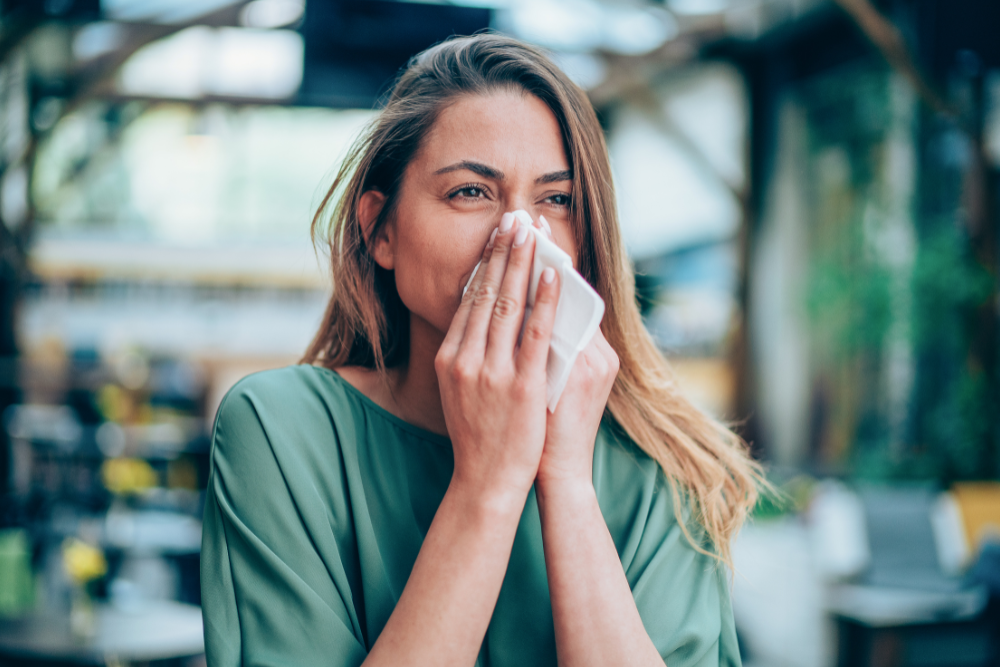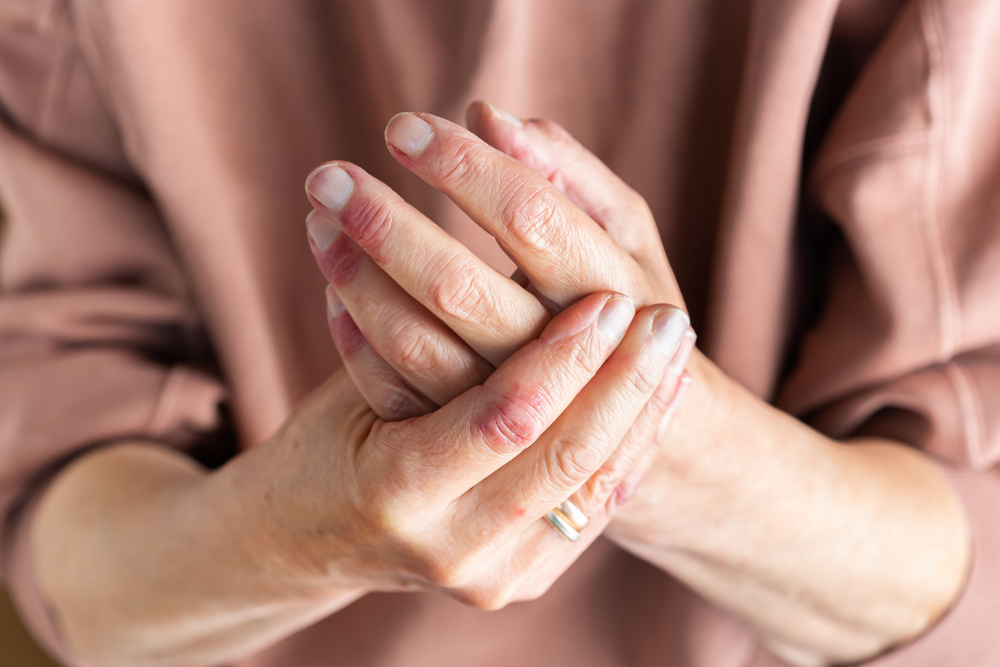Eczema, or atopic dermatitis, is a chronic skin condition marked by itchy, inflamed skin. While it’s common in children, adults aren’t spared. Understanding what triggers eczema and how to manage these flare-ups is essential knowledge for those living with this troublesome skin condition. Stay tuned as we explore the world of eczema, uncovering its causes, symptoms, and effective strategies for managing it.
Common Triggers of Eczema
Eczema, a condition characterised by itchy, dry skin, can be frustrating to live with. It’s essential to recognise that eczema triggers can vary significantly from person to person. Identifying these triggers is a vital step in managing symptoms of eczema effectively.
Sensitive Skin and Environmental Factors
Individuals with sensitive skin are more prone to eczema flare-ups . Environmental irritants like pollen, dust mites, and pet dander can exacerbate symptoms (1). In some cases, extreme weather conditions – either too hot or too cold – can also trigger eczema, leading to very dry, itchy skin.
Food Allergies
Food allergies are a common trigger for many with eczema. Common culprits include dairy, nuts, soy, and gluten. These allergies can cause the immune system to overreact, resulting in skin inflammation and eczema symptoms (2).
Stress
Stress doesn’t just affect the mind; it can also impact the skin. Stress is known to exacerbate eczema symptoms, leading to more severe flare-ups (3).
Skin Infections
Bacterial, viral, or fungal skin infections can worsen eczema. A compromised skin barrier, common in eczema sufferers, makes the skin more susceptible to infections, which can, in turn, trigger more severe eczema symptoms (4).
Contact with Irritants
Everyday substances like soaps, detergents, and certain fabrics can cause contact dermatitis, aggravating eczema. It’s essential for those with eczema to identify and avoid such irritants to prevent eczema flare-ups (5).
Hormonal Changes
Hormonal fluctuations, particularly in women, can trigger or worsen eczema (6). This is often observed during pregnancy, menstruation, or menopause.
Genetics and Immune System Factors
A family history of eczema or other allergic conditions often plays a role. Additionally, an overactive immune system can contribute to the development of eczema (7).

Environmental Allergens and Eczema
Environmental allergens play a significant role in triggering eczema flare-ups. For those grappling with eczema, understanding and managing these triggers is key to achieving better skin health.
Pollen and Seasonal Allergies: Pollen, a common environmental allergen, can exacerbate eczema symptoms, especially during spring and summer (8). Seasonal changes often bring about an increase in itchy, inflamed skin for many eczema sufferers.
Dust Mites: These microscopic creatures thrive in household dust and are a major trigger for many with eczema (9). Their waste products can irritate the skin and trigger immune responses, leading to eczema flare-ups.
Pet Dander: Animal fur and dander are common triggers for eczema (10). Pets like dogs and cats shed tiny flakes of skin that can cause allergic reactions, resulting in itchy, red skin.
Mould Spores: Mould, both indoors and outdoors, releases spores that can trigger eczema. These spores, when inhaled or in contact with the skin, can lead to an allergic reaction, aggravating eczema symptoms (11).
Environmental Pollutants: Urban environments with higher pollution levels can also trigger eczema. Pollutants can weaken the skin barrier, making the skin more susceptible to irritants and allergens.
Climate and Humidity: Extreme weather conditions – very dry or excessively humid – can impact eczema. Low humidity can dry the skin, while high humidity can increase sweating and irritation (12).
Irritants in Water: Hard water, containing high levels of minerals like calcium and magnesium, can also aggravate eczema. These minerals can dry out the skin, leading to more severe symptoms (13).
Managing exposure to environmental allergens is a key aspect of controlling eczema. Simple steps like using allergen-proof covers, maintaining a clean home environment, and using air purifiers can significantly reduce the impact of these allergens.
Stress and Emotional Factors in Eczema
While eczema is often considered a physical condition, it’s closely intertwined with emotional health. Stress and emotional factors can significantly influence the severity and frequency of eczema flare-ups (3).
Stress-Induced Flare-Ups: Stress is a well-known trigger for eczema. When stressed, the body releases hormones like cortisol, increasing inflammation and weakening the immune system. This can lead to a worsening of eczema symptoms, such as itchy, inflamed skin.
The Emotional Toll of Eczema: Living with eczema can be emotionally challenging. The visible nature of the condition can affect self-esteem and social interactions, leading to feelings of anxiety and depression. These emotional factors can, in turn, exacerbate eczema symptoms, creating a vicious cycle.
Anxiety and Its Effects: Anxiety, closely linked to stress, can trigger or worsen eczema. The body’s response to anxiety can aggravate skin conditions, leading to more severe flare-ups.
Sleep Disturbances: Eczema can disrupt sleep due to itching and discomfort. Poor sleep can increase stress levels, further aggravating eczema and resulting in more intense itching and discomfort.
Mind-Skin Connection: The mind-skin connection is a vital aspect of eczema. Emotional stressors can trigger a physical response in the skin, highlighting the importance of managing stress and emotional well-being as part of eczema treatment.

Lifestyle Habits and Eczema
Lifestyle habits play a pivotal role in the management of eczema. Making informed choices about daily routines can significantly impact the frequency and severity of eczema flare-ups.
-
Skincare Routine: A consistent skincare routine is essential for managing eczema. Using gentle, fragrance-free cleansers and moisturisers can help maintain the skin’s natural barrier, reducing dryness and irritation. Moisturising immediately after bathing can also lock in moisture, helping to prevent very dry skin (14).
-
Bathing Habits: Overbathing, especially in hot water, can strip the skin of natural oils, leading to dryness and exacerbating eczema. Short, lukewarm baths or showers are recommended. Adding colloidal oatmeal or baking soda to bath water can soothe irritated skin (15).
-
Clothing Choices: What you wear can affect eczema. Clothes made from soft, breathable fabrics like cotton are best, as they minimise skin irritation. Avoiding tight-fitting or scratchy materials like wool can also help prevent flare-ups.
-
Stress Management: Since stress is a known trigger for eczema, adopting stress-reduction techniques such as mindfulness, yoga, or regular exercise can be beneficial. These activities can help lower stress levels, reducing the likelihood of eczema flare-ups. Learn nine ways to look after your mental health.
-
Sleep Patterns: Good sleep hygiene is important for overall health and can influence eczema. Lack of sleep can increase stress and weaken the immune system, potentially worsening eczema symptoms. Establishing a regular sleep schedule can help improve skin health (16).
-
Avoiding Irritants: Being aware of and avoiding environmental irritants like harsh detergents, perfumes, and certain cleaning products can reduce eczema symptoms. Non-biological laundry products are often better suited for those with sensitive skin.
-
Diet and Hydration: A balanced diet rich in fruits, vegetables, and omega-3 fatty acids can support skin health. Staying hydrated by drinking plenty of water also helps maintain skin hydration, which can benefit those with eczema.
-
Smoking and Alcohol: Smoking and excessive alcohol consumption can negatively impact skin health. Quitting smoking and moderating alcohol intake can improve eczema symptoms and overall well-being.

Choosing the Right Skincare Products for Eczema
Navigating the world of skin care products is essential for those with eczema, as the right choices can significantly alleviate symptoms and prevent eczema flare-ups. Understanding what to look for and avoid can make a big difference in skin health.
- Moisturisers: Moisturisers are a cornerstone of eczema care. Look for products labelled as “fragrance-free” and “hypoallergenic”. Creams and ointments are generally more effective than lotions for very dry skin, as they contain more oil and less water. Applying moisturiser immediately after bathing helps lock in moisture (14).
- Gentle Cleansers: Avoid harsh soaps and opt for mild, fragrance-free cleansers. Non-soap cleansers with a neutral pH are less likely to irritate sensitive skin. Avoiding products with alcohol, dyes, and other irritants can also help prevent eczema flare-ups.
- Prescription Creams and Ointments: Topical corticosteroids are commonly used to reduce inflammation and itching. It’s important to use these as directed by a healthcare professional, as overuse can lead to skin thinning (17).
- Sunscreens: Sun protection is essential, but some sunscreens can irritate eczema. Mineral-based sunscreens containing zinc oxide or titanium dioxide are less likely to cause irritation. Always opt for sunscreens that are fragrance-free and formulated for sensitive skin (18).
- Ingredients to Avoid: Skincare products containing alcohol, fragrances, dyes, and certain preservatives can trigger eczema flare-ups. Reading labels and being aware of potential irritants is important in selecting suitable products (19).
- Natural and Organic Products: While ‘natural’ and ‘organic’ products can be appealing, they aren’t always the best choice for eczema. Some natural ingredients, like essential oils, can be irritants. Always patch-test new products before full application.
- Bath Additives: Colloidal oatmeal or baking soda can be added to bath water for their soothing properties. However, avoid bubble baths and other additives that might dry out the skin.
- Allergy Testing for Contact Dermatitis: If allergic contact dermatitis is suspected, patch testing can identify specific allergens to avoid in skincare products.
Selecting the right skincare products is a personalised journey for those with eczema. Through trial and error and with the guidance of a dermatologist, individuals can find products that soothe and protect their skin, helping to manage symptoms and improve quality of life.
Exploring Effective Treatment Options for Eczema Management
Effective treatment of eczema involves a combination of skincare strategies, lifestyle changes, and medical treatments. With advancements in healthcare, accessing treatments has become more convenient, including options like getting online treatments delivered directly to your door through hub.health.
- Topical Treatments: Topical corticosteroids are commonly prescribed for reducing inflammation and itching associated with eczema. They come in various strengths and should be used as directed by a healthcare provider. Non-steroidal topical medications are also effective for some individuals (17).
- Systemic Medications: For moderate to severe eczema, systemic medications that affect the entire body may be necessary. These can include oral corticosteroids, immunosuppressants, or biologic drugs. These are typically prescribed when topical treatments are not sufficient (17).
- Phototherapy: Phototherapy or light therapy involves exposing the skin to controlled amounts of natural sunlight or artificial UV light. This treatment can be effective for chronic eczema that doesn’t respond to topical treatments (20).
- Wet Wrap Therapy: This involves applying topical steroids and moisturisers to the affected area, then wrapping it with wet bandages to enhance the medication’s effectiveness and hydration of the skin.
- Stress Management and Counselling: Since stress can exacerbate eczema, stress-reduction techniques and counselling can be part of an effective treatment plan.
- Convenient Online Treatments: For those seeking convenience and personalised care, hub.health offers an innovative solution. Our platform allows you to consult with healthcare professionals online, receive personalised treatment plans, and have your eczema treatments delivered to your door. This can be particularly beneficial for those with busy schedules or limited access to dermatologists.
Effective eczema treatment is a multifaceted approach that may include a combination of medical treatments, lifestyle changes, and supportive therapies. With the added convenience of services like hub.health, managing eczema has become more accessible, allowing individuals to focus on improving their skin health and overall well-being.
Get eczema treatments online with hub.health. Start your consult today!
Sources:
-
National Library of Medicine. Eczema [internet]. 2024 [cited 24 July 24]. Available from: https://www.ncbi.nlm.nih.gov/books/NBK538209/
-
National Library of Medicine. Diet and Dermatitis: Food Triggers [internet]. 2014 [cited 24 July 24]. Available from: https://www.ncbi.nlm.nih.gov/pmc/articles/PMC3970830/
-
American Academy of Dermatology. STRESS: IS IT A COMMON ECZEMA TRIGGER? [internet]. 2024 [cited 24 July 24]. Available from: https://www.aad.org/public/diseases/eczema/childhood/triggers/stress
-
National Library of Medicine. The role of bacterial skin infections in atopic dermatitis: expert statement and review from the International Eczema Council Skin Infection Group [internet]. 2019 [cited 24 July 24]. Available from: https://www.ncbi.nlm.nih.gov/pmc/articles/PMC7317931/
-
National Library of Medicine. Harmful Effects of Synthetic Surface-Active Detergents against Atopic Dermatitis [internet]. 2015 [cited 24 July 24]. Available from: https://www.ncbi.nlm.nih.gov/pmc/articles/PMC4310308/
-
National Library of Medicine. Hormonal Effects on Asthma, Rhinitis, and Eczema [internet]. 2022 [cited 24 July 24]. Available from: https://www.ncbi.nlm.nih.gov/pmc/articles/PMC9392967/
-
National Library of Medicine. Eczema in early life: Genetics, the skin barrier, and lessons learned from birth cohort studies [internet]. 2010 [cited 24 July 24]. Available from: https://www.ncbi.nlm.nih.gov/pmc/articles/PMC2957505/
-
National Library of Medicine. Birch pollen influence the severity of atopic eczema – prospective clinical cohort pilot study and ex vivo penetration study [internet]. 2015 [cited 24 July 24]. Available from: https://www.ncbi.nlm.nih.gov/pmc/articles/PMC4629950/
-
National Library of Medicine. Mite allergy and atopic dermatitis: Is there a clear link? (Review) [internet]. 2020 [cited 24 July 24]. Available from: https://www.ncbi.nlm.nih.gov/pmc/articles/PMC7465295/
-
National Library of Medicine. Does Exposure to Cats or Dogs in Early Life Alter a Child’s Risk of Atopic Dermatitis? [internet]. 2010 [cited 24 July 24]. Available from: https://www.ncbi.nlm.nih.gov/pmc/articles/PMC3052969/
-
National Library of Medicine. Lifetime prevalence of childhood eczema and the effect of indoor environmental factors: Analysis in Hispanic and non-Hispanic white children [internet]. 2016 [cited 24 July 24]. Available from: https://www.ncbi.nlm.nih.gov/pmc/articles/PMC4704378/
-
National Library of Medicine. Warm, Humid, and High Sun Exposure Climates are Associated with Poorly Controlled Eczema: PEER (Pediatric Eczema Elective Registry) Cohort, 2004–2012 [internet]. 2013 [cited 24 July 24]. Available from: https://www.ncbi.nlm.nih.gov/pmc/articles/PMC3869874/
-
National Library of Medicine. The association between domestic hard water and eczema in adults from the UK Biobank cohort study [internet]. 2022 [cited 24 July 24]. Available from: https://www.ncbi.nlm.nih.gov/pmc/articles/PMC9804584/#bjd21771-note-1155
-
National Institute of Allergy and Diseases. Eczema (Atopic Dermatitis) Treatment [internet]. 2024 [cited 24 July 24]. Available from: https://www.niaid.nih.gov/diseases-conditions/eczema-treatment
-
Sala-Cunill A, et al. (2018). Basic skin care and topical therapies for atopic dermatitis: Essential approaches and beyond.
-
Silverberg JI, et al. (2015). Sleep disturbances in adults with eczema are associated with impaired overall health: A U.S. population-based study. Available from: https://www.sciencedirect.com/science/article/pii/S0022202X15370469
-
National Library of Medicine. Eczema: Learn More – Steroids and other topical medications [internet]. 2021 [cited 24 July 24]. Available from: https://www.ncbi.nlm.nih.gov/books/NBK424899/
-
Medical News Today. What to know about sunscreen for eczema [internet]. 2022 [cited 24 July 24]. Available from: https://www.medicalnewstoday.com/articles/sunscreen-for-eczema
-
National Eczema Association. 8 skincare ingredients to avoid if you have eczema, according to dermatologists [internet]. 2024 [cited 24 July 24]. Available from: https://nationaleczema.org/blog/8-skincare-ingredients-to-avoid/
-
American Academy of Dermatology. ECZEMA TREATMENT: PHOTOTHERAPY [internet]. 2024 [cited 24 July 24]. Available from: https://www.aad.org/public/diseases/eczema/childhood/treating/phototherapy





